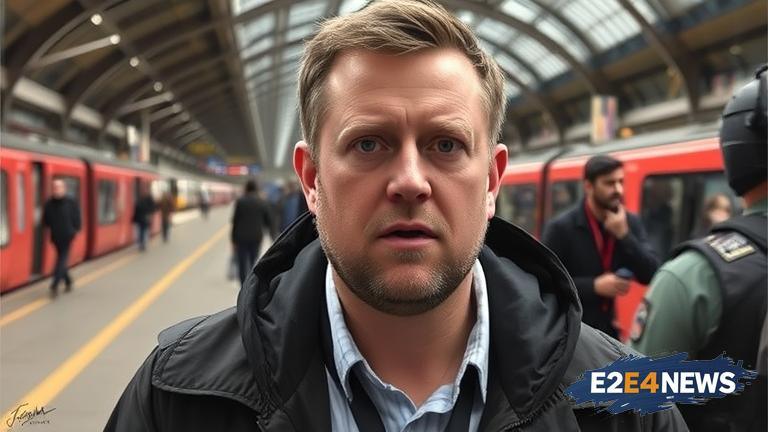Tommy Robinson, a well-known figure in the far-right movement, was taken into custody by British Transport Police at St Pancras station in London. The arrest was made in connection with an alleged assault, which is currently being investigated by the authorities. Robinson, whose real name is Stephen Yaxley-Lennon, has been a vocal critic of Islam and has been involved in numerous high-profile controversies throughout his career. The incident at St Pancras station is the latest in a long line of run-ins with the law for the activist, who has previously been convicted of contempt of court and has served time in prison. The arrest has sparked a heated debate on social media, with many of Robinson’s supporters claiming that he is being unfairly targeted by the authorities. However, others have welcomed the news, citing Robinson’s history of hate speech and incitement. The investigation into the alleged assault is ongoing, and it is unclear at this time what specific charges Robinson may face. The incident has also raised questions about the role of far-right activism in British society, with many calling for greater action to be taken to combat hate speech and extremism. Robinson’s arrest has been condemned by some of his supporters, who claim that he is being silenced for his views. However, others have argued that the activist’s actions have consequences and that he must be held accountable for his words and deeds. The case has also sparked a wider debate about the balance between free speech and hate speech, with many arguing that Robinson’s rhetoric has crossed the line into incitement. As the investigation continues, it remains to be seen what the outcome will be for Robinson and what implications the case may have for the wider far-right movement. The incident has also highlighted the need for greater awareness and education about the dangers of hate speech and extremism, and the importance of promoting tolerance and understanding in society. Furthermore, the case has raised questions about the role of social media in amplifying hate speech and extremism, and the need for greater action to be taken to combat online abuse. The arrest of Tommy Robinson is a complex and multifaceted issue, with many different perspectives and opinions on the matter. However, one thing is clear: the case has sparked a vital and necessary debate about the importance of combating hate speech and extremism in all its forms. The incident has also highlighted the need for greater support and protection for victims of hate crime, and the importance of promoting a culture of tolerance and respect in society. In addition, the case has raised questions about the role of the media in reporting on far-right activism and hate speech, and the need for greater responsibility and sensitivity in covering these issues. As the investigation into the alleged assault continues, it is essential that the authorities take a robust and thorough approach to addressing the issue, and that the wider community comes together to promote a message of tolerance and respect. The case of Tommy Robinson is a reminder that hate speech and extremism have no place in our society, and that we must all work together to combat these evils. The incident has also sparked a wider debate about the importance of community cohesion and social inclusion, and the need for greater action to be taken to promote these values. In conclusion, the arrest of Tommy Robinson is a complex and multifaceted issue, with many different perspectives and opinions on the matter. However, one thing is clear: the case has sparked a vital and necessary debate about the importance of combating hate speech and extremism in all its forms, and the need for greater awareness and education about the dangers of these evils.





